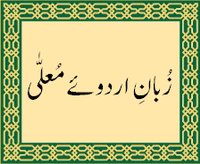Urdu movement
| Urdu literature ادبیاتِ اُردُو | |
|---|---|
Urdu language | |
| Major figures | |
| Amir Khusrau (father of Urdu literature) - Wali Dakhani (father of Urdu poetry) - Mir Taqi Mir - Ghalib - Abdul Haq (Baba-e-Urdu) | |
| Urdu writers | |
| Writers – Novelists – Poets | |
| Forms | |
| Ghazal – Fiction | |
| Institutions | |
| Anjuman-i Taraqqi-i Urdu Urdu movement Literary Prizes | |
| Related Portals Literature Portal Pakistan Portal | |

The Urdu movement was a socio-
History
Hindi-Urdu controversy

The
Urdu in Muslim politics
Sir Syed's call for the adoption of Urdu as the language of Indian Muslims won extensive support from the
Urdu in Pakistan and India
In Pakistan, Urdu has been so far, the
Independent India adopted Urdu as one of its 22 scheduled languages although its counterpart, Hindi, enjoys the status of official language. Urdu is also officially recognised by the states of
Despite being given the status of a scheduled language, there have been concerns that the Urdu language has largely been on a decline in India. This decline has been attributed to reasons such as lack of promotional policies by central language regulation boards, the promulgation and preference of Urdu's counterpart Hindi as the Indian union's official language since 1950, the higher number of Hindi-speakers in India leading to the suppression of Urdu, the partition of India and Urdu's national language status in Pakistan overshadowing the language's prospects in India, as well as the lack of many schools in India teaching Urdu as a medium of instruction.[7]
See also
- Urdu
- Pakistan movement
- Hindi-Urdu controversy
- Aligarh Movement
- Anti-Hindi agitations of Tamil Nadu
References
- ^ a b c d e f g h R. Upadhyay. "Urdu Controversy – is dividing the nation further". South Asia Analysis Group. Archived from the original (PHP) on 11 March 2007. Retrieved 15 October 2006.
- ^ Muslim Politics and Leadership in the South Asian Sub-continent, Yusuf Abbasi, 1981, page 65-66
- ^ R. Upadhyay. "Indian Muslims – under siege?". South Asia Analysis Group. Archived from the original (PHP) on 2 October 2006. Retrieved 19 October 2006.
- ^ R. C. Majumdar (1969). Struggle for Freedom. Bharatiya Vidya Bhavan. p. 127. ASIN: B000HXEOUM.
- ^ Muslim Politics and Leadership in the South Asian Sub-continent, Yusuf Abbasi, 1981, page 90
- ^ Yusuf Abbasi (1981). Muslim Politics and Leadership in the South Asian Sub-continent. Institute of Islamic History, Culture, and Civilization, Islamic University (Islamabad). p. 90.
- ^ Shahabuddin, Syed (13 May 2011). "Urdu in India: victim of Hindu nationalism & Muslim separatism – i". The Milli Gazette. Retrieved 9 March 2012.
